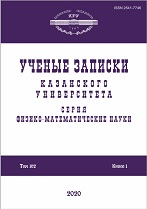|
This article is cited in 3 scientific papers (total in 3 papers)
Universal hash functions from quantum procedures
F. M. Ablayevab, M. T. Ziatdinovba
a Zavoisky Physical-Technical Institute, FRC Kazan Scientific Center, Russian Academy of Sciences, Kazan, 420029 Russia
b Kazan Federal University, Kazan, 420008 Russia
Abstract:
Modern quantum technologies are NISQ (Noisy Intermediate-Scale Quantum) devices, which are used to create insufficiently accurate quantum computers with low computing power. However, quantum technologies have advanced considerably during the past years. Thus, the issue of demonstrating “quantum supremacy” in the era of NISQ technologies is on the agenda. This study demonstrates that “quantum supremacy” is forthcoming. We propose procedures for constructing a universal family of hash functions based on a quantum hashing process that maps the original sequence $w$ to a quantum hash state and then by random transformation to the state $\mid{\psi}$ and generating the sequence $u$, which is an approximate description of the state $\mid{\psi}$. We proved that the proposed procedure generates a family of nondeterministic hash functions $\mathcal{F}$, which allow us to reliably distinguish between different arguments. The $\mathcal{F}$ family can be considered an $\epsilon$-universal family of nondeterministic hash functions. We assume that the development of this research area will cast light on the effect of “quantum supremacy” and will also have a certain impact on the advance of post-quantum cryptography.
Keywords:
quantum hash functions, universal hash family, quantum supremacy.
Received: 14.07.2020
Citation:
F. M. Ablayev, M. T. Ziatdinov, “Universal hash functions from quantum procedures”, Uchenye Zapiski Kazanskogo Universiteta. Seriya Fiziko-Matematicheskie Nauki, 162, no. 3, Kazan University, Kazan, 2020, 259–268
Linking options:
https://www.mathnet.ru/eng/uzku1559 https://www.mathnet.ru/eng/uzku/v162/i3/p259
|

| Statistics & downloads: |
| Abstract page: | 113 | | Full-text PDF : | 112 | | References: | 16 |
|




 Contact us:
Contact us: Terms of Use
Terms of Use
 Registration to the website
Registration to the website Logotypes
Logotypes








 Citation in format
Citation in format 
